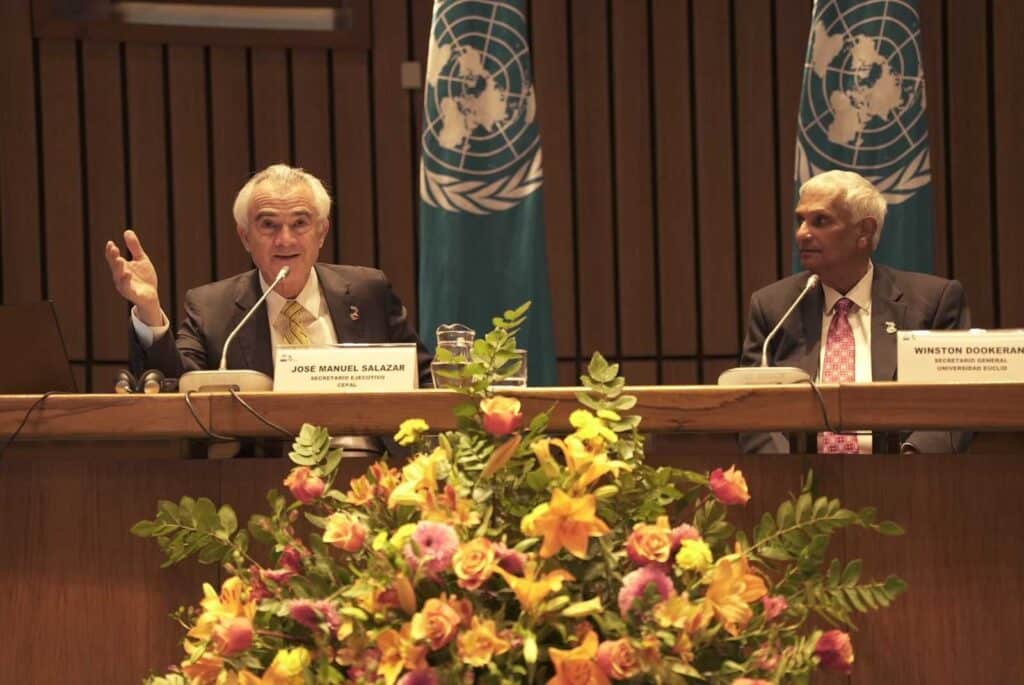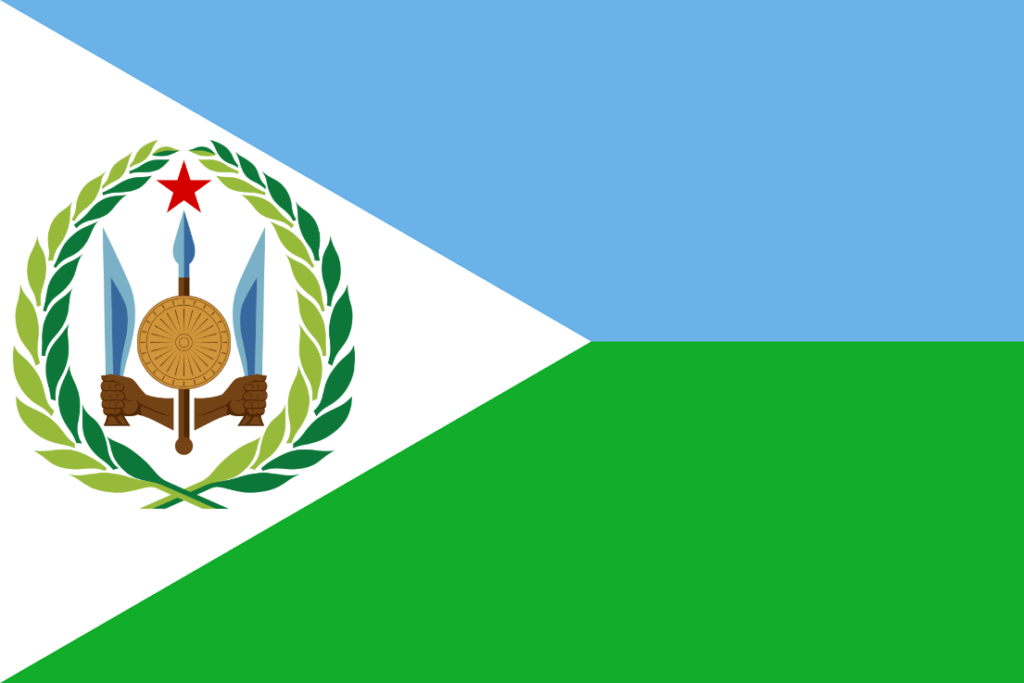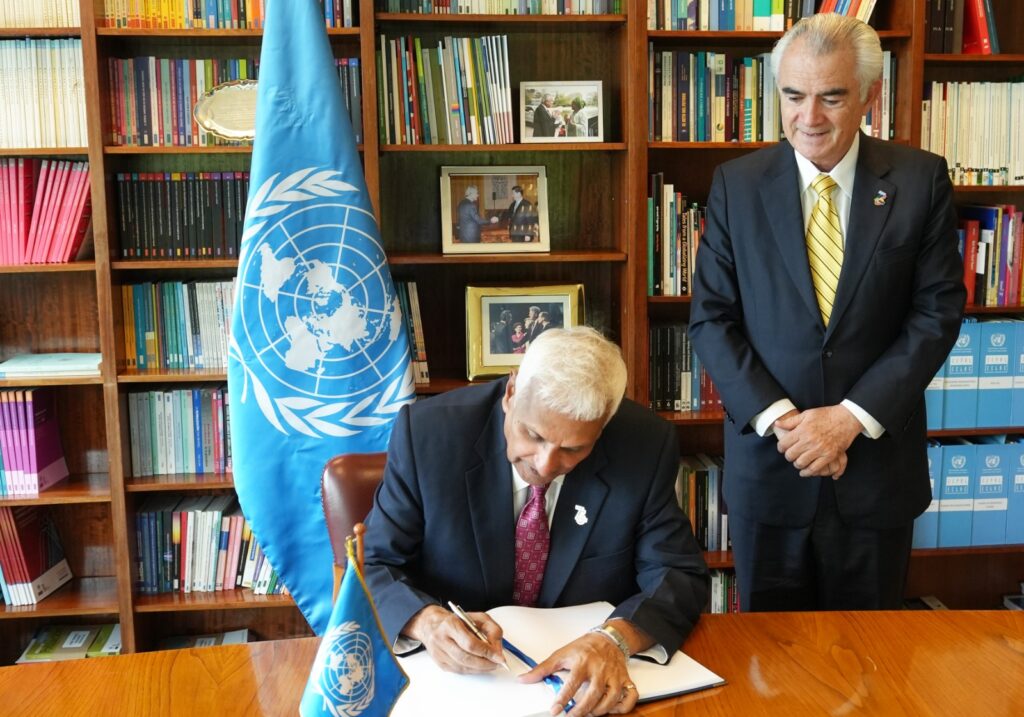Source: https://www.cnc3.co.tt/dookeran-wants-caribbean-to-shift-its-integration-model-and-forge-wider-convergence-spaces/
Photo: Trinidad and Tobago economist Winston Dookeran (Right) and ECLAC executive secretary José Manuel Salazar-Xirinachs at Wednesday’s lecture series (Photo courtesy ECLAC )
Former Trinidad and Tobago finance minister, Winston Dookeran, is calling for a shift in the Caribbean integration model in order to forge wider convergence spaces for approaching production, the institutional framework and economic frontiers.
Dookeran, an economist and former central bank governor, said the current integration model seems limited by size, design and inertia.
Dookeran was the the fifth presenter to participate in the Keynote Lecture Series organized by the United Nations Economic Commission for Latin America and the Caribbean (ECLAC) to commemorate the UN’s regional organization’s 75th anniversary.
The lecture series is also intended to increase the visibility of the Caribbean situation and perspective and contribute to subregional thinking and action.
In his presentation entitled “Structure and Synergy in Development: The Caribbean Setting and its Future,” on Wednesday night, Dookeran, the current Secretary-General of Euclid University, analyzed the way in which the structure of the Caribbean economy is changing in a multipolar world, as well as examining the “geometry” of the crisis prompted by coronavirus (COVID-19) pandemic.
He referred to the subregion’s difficulties for achieving the Sustainable Development Goals (SDGs) of the 2030 Agenda for Sustainable Development and addressed the limitations and restrictions that hamper the Caribbean from accessing and taking advantage of development finance.
“The key to tackling the development challenges facing the Caribbean lies in the strategy for structural change,” Dookeran argued, stressing that in a post-COVID-19 era, it is critical to have “shock absorbers” that can be a buffer against economic shocks – an issue that must be part of the agenda for reforming the international financial architecture.
Dookeran highlighted the role of governance, institutional strengthening and the redefinition of the role of the state for closing the gap between theory and practice and achieving the desired development.
He said it is necessary to design an institutional framework for promoting “sustainable social equity,” noting this includes universal health coverage, guaranteed minimum income for all, and robust and inclusive community governance.
“The time has come for resetting the state and market roles in the development process. A new role for the state, neither controlling nor facilitating, must make change happen. A new synergy between the state and the market – a ‘catalytic’ role for the state – must be explored.”
Dookeran further posed the need to prepare for the technological advance entailed by artificial intelligence, which involves, for example, the digitalization of the economy and measures to promote technical change in Small and Medium-sized Enterprises (SMEs).
During his presentation, the prominent Trinidad and Tobago economist described ECLAC as an internationally recognized “cradle of development ideas.
“ECLAC has stood firm as an institution of dignity,” which “has never deviated from the search of the public good of development” and has remained loyal to the mission of seeking new ideas for countries’ progress, he said.
In his remarks, , ECLAC’s Executive Secretary, José Manuel Salazar-Xirinachs emphasized that “the Caribbean is as beautiful as it is vulnerable and fragile.”
“Many Caribbean countries are characterized by significant multidimensional vulnerabilities that challenge their path to long-term sustainable development.”
He said since they are particularly vulnerable to the impacts of climate change, “the subregion seems stuck in a cycle of disasters, recovery with low growth, loans, large deficits, and debt that challenge efforts to progress towards resilient and sustainable development.”
In response to this complex scenario, Salazar-Xirinachs said that Caribbean leaders have been united and particularly vocal in global forums, calling for redoubling efforts to address climate change and deliver climate justice; seeking support to address natural disasters; and reforming the global financial architecture to make it fairer and more inclusive.
ECLAC said Caribbean diplomats have been instrumental contributors to efforts to re-imagine the global economic order, he said, mentioning examples such as the Bridgetown Initiative, led by the Barbados Prime Minister Mia Amor Mottley; the Financing for Development in the Era of COVID-19 and Beyond Initiative, promoted by the United Nations Secretary-General, António Guterres, and co-chaired by the Prime Minister of Jamaica; and the Loss and Damage Fund, which was championed by the Alliance of Small Island States (AOSIS) and secured under the Chairmanship of Antigua and Barbuda during COP27.
In addition, Antigua and Barbuda will host the Fourth International Conference on Small Island Developing States (SIDS) and will lead discussions towards a bold new Programme of Action.
Salazar-Xirinachs said the current President of the 78th session of the UN General Assembly, Ambassador Dennis Francis of Trinidad and Tobago, has also underscored the need to defend the cause of Small Island Developing States.
Salazar-Xirinachs said, “At ECLAC, we are honored to help elevate the Caribbean perspective and to contribute to subregional thinking and action on sustainable development.”
SANTIAGO, Chile, Oct 26, CMC –
Courtesy CMC/af/ir/2023
This post is also available in: French










